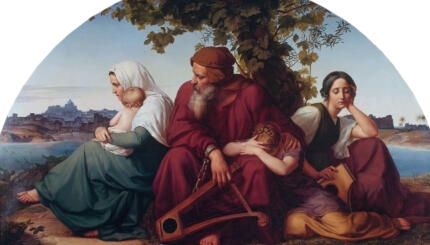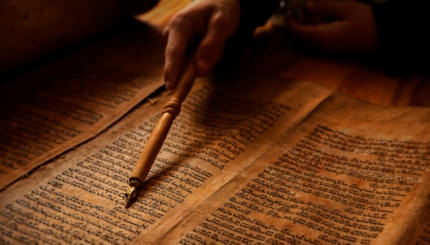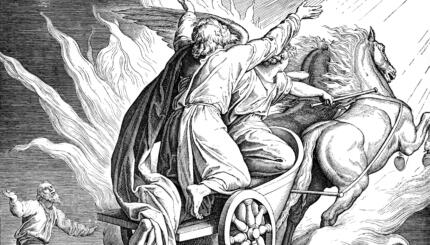Commentary on Parashat Masei, Numbers 33:1 - 36:13
The last portion in the Book of Numbers ends with a second story about the five daughters of Zelophehad — Mahlah, Noah, Hoglah, Milcah and Tirzah. The first story, in Numbers 27, shows how the sisters demanded and received a promise — from God, no less — that they will inherit their family’s ancestral land (since their father died without leaving a son).
Here in Parashat Masei, the daughters’ male relatives challenge the women’s inheritance right in order to protect ownership of tribal land. Moses responds al pi Adonai — “at God’s bidding” (Numbers 36:5), by amending the new law. The change requires women who inherit ancestral land to marry into a family of their father’s tribe (Numbers 36:6), thereby limiting these women’s choice of spouses, but keeping the property within the tribe. The portion and the book end by confirming that the sisters did marry accordingly.
This sequel in Numbers 36 appears to be a setback after the daughters’ startling triumph in Parashat Pinhas (Numbers 27), where they won significant inheritance rights for themselves and for their “sisters” in the future. The five sisters in particular, and Israelite women in general, walk away from Parashat Masei with less than they had before. As some scholars observe, when the sisters marry their first cousins, they essentially hand over their inheritance to the same men who would otherwise have inherited the land had the women never stood up for themselves (Hara E. Person, “Masa’ei: Boundaries and Limits,” in The Women’s Torah Commentary, 200, p. 327; and Jacob Milgrom, Numbers, 1990, p. 298). Moreover, in giving up some of their gains for the sake of larger familial and communal needs, they seem to perpetuate the all-too-familiar situation of women foregoing their own needs for the sake of others in the family.
Nevertheless, while the decree in this Torah portion certainly is a step back from the full rights given to the daughters previously, it is not a full retreat; they still end up with more than they had in the first place. To begin with, the sisters marry from a position of strength, not dependency. What would have happened to the sisters had they not stepped forward to ask for their inheritance? Given the frequency with which the Torah reminds us of our societal obligation to care for widows and orphans, we can guess what might have happened to Zelophehad’s daughters had they remained landless. Furthermore, the daughters’ actions and triumph eliminate a whole category of dependent orphans (the girls and women who until then did not inherit).

Help us keep Jewish knowledge accessible to millions of people around the world.
Your donation to My Jewish Learning fuels endless journeys of Jewish discovery. With your help, My Jewish Learning can continue to provide nonstop opportunities for learning, connection and growth.
The story of Zelophehad’s daughters invites us to reflect on the roles that family members and community play in one’s life. Our freedom as women to make choices and demands stems in part from our Jewish heritage in which women such as Mahlah, Noah, Hoglah, Milcah, and Tirzah stood together to argue for equal rights, convincing leadership — human and divine — of the justness of their cause. Today our individual commitments and decisions from the everyday to the profound (taking a class at night, accepting a board position, making a career change) affect our partners and our children, regardless of who makes them. Likewise, our seemingly private decisions launch a whole range of new communal developments. For example, working and studying mothers and their partners require, and therefore initiate, new structures for childcare that were not available to the previous generation. Such choices compel (or inspire) others to “think outside the box” to accommodate new challenges.
Especially in egalitarian relationships, each person’s words and visions, choices and decisions, actions and reactions, construct an unfolding dialogue, ever-growing and often life-changing in much wider circles than one would have envisioned. What began as a seemingly private demand by five sisters for their share of land became a new law to protect all women in unforeseen circumstances.
In Parashat Masei, at the end of the Israelites’ journey in the wilderness, the amending of the ruling for Zelophehad’s daughters (along with the concomitant change in inheritance laws in perpetuity for all Israelites, 36:8-9) teaches modern lessons for intertwined lives: in a society, community, or family, one person’s needs and desires must be weighed against those of others. Final authority should not belong to one member only, nor should laws be made based on the interests of only one party.
The amendments in Numbers 36 also emphasize the need for lawmakers to look always at the rights of all citizens, and not just at the issues brought by lobbyists. The women’s movement, like all movements of liberation, discovered long ago that the most effective and enduring changes are those that create justice for all members of society.
This observation does not negate the need to speak out for special interests. Just as the prayer of our matriarch Hannah became for the rabbis of the the model of how to pray (I Samuel 1:10-11; BT B’rachot 31a-b), so in their own time, the daughters of Zelophehad model how to be an advocate for one’s own rights. Had Hannah not prayed or the sisters not spoken up, no change would have taken place. Speaking out opens up a public space where the diverse needs of community members can be examined in order to negotiate for equitable resolutions.
Because the original ruling given in Parashat Pinhas benefited the daughters but not the tribe, the amendment here in Parashat Masei demonstrates how an idea may require fine-tuning even after it becomes law.
The ending of the Book of Numbers sets the stage for processes of change, showing us that even within the Torah itself, lawmaking is an inexact science requiring flexibility to change as issues arise and society evolves. We honor the sisters’ ability to speak up, and their grace to concede when their gain is shown to be against community interests. We are the inheritors of their chutzpah and their quest for equal rights.
Reprinted with permission from The Torah: A Women’s Commentary, edited by Tamara Cohn Eskenazi and Andrea L. Weiss (New York: URJ Press and Women of Reform Judaism, 2008).
parsha
Pronounced: PAR-sha or par-SHAH, Origin: Hebrew, portion, usually referring to the weekly Torah portion.

Help us keep Jewish knowledge accessible to millions of people around the world.
Your donation to My Jewish Learning fuels endless journeys of Jewish discovery. With your help, My Jewish Learning can continue to provide nonstop opportunities for learning, connection and growth.


